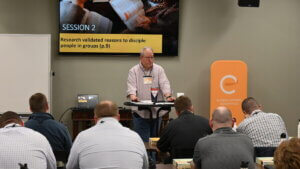There are six requirements that must be satisfied in order for a contribution to be tax deductible.
The IRS looks at the substance and not the form of a transaction as the controlling factor. Did the donor intend to make a contribution to the church or did the donor only intend to benefit the designated cause or individual by using the church to obtain a tax deduction on an otherwise non-deductible gift?
- The gift must be a gift of cash or other property (IRS §170) In the case of donated property the church may give a letter indicating when the property was received and a brief description of the property but the church may not assign or include a value. It is the donor’s responsibility to have the item appraised.
- The gift must be delivered before the close of the year Charitable contributions must be claimed in the year in which they are delivered to the church.
Delivery date is:
The date it is actually received by the church (Post-dating a check does not help). If the check is delivered after the close of the year, it counts in the new year. One exception is a check that is mailed through the United States Postal Service to the church—it is deductible in the year the check is mailed (and postmarked), even if it is received early in the next year. The postmark counts as delivery date and the envelope should be retained. - The gift must be unconditional and without personal benefit to the donor Donors cannot create restrictions on how the church may use a charitable contribution. However, the church may create a restricted or designated fund and allow contributions to that fund.
Payments by participants and non-participants to their church for short-term mission trips are deductible as charitable contributions if the trip involves “no significant element of personal pleasure, recreation, or vacation.”
Contributions generally are deductible only to the extent they exceed the value of any goods or services received by the donor in return for the contribution. - The gift must be made “to or for the use of” a qualified charity.
- The gift must not be in excess of the amounts allowed by law.
There are limits on the amount of a contribution that can be deducted. Currently that amount is 50% of AGI. In some cases, contributions that exceed these limits can be “carried over” and claimed in future years. - The gift must be substantiated The church must provide the appropriate substantiation. The method will vary according to the type of gift and the IRS applicable rules. Additional rules apply to the donation of vehicles.
Contributions which are not deductible:
- A contribution to a specific individual.
- A contribution to a non-qualified organization.
- The part of a contribution for which you receive or expect to receive an equal financial or economic benefit.
- The value of your time or services—a plumber who donates his time and materials may receive tax credit for materials but not for the labor.
- Your personal, living, or family expenses.
- Certain contributions of partial interests in property.
- Rent-free building space. The value of rent-free building space made available to a church cannot be claimed as a charitable contribution. This includes motels, meeting rooms, etc.
If you have questions about any of the above topics, please contact Jo Ellen Johnson, CPA direct at 334-613-2204, email at jjohnson@alsbom.org, or contact Lee Wright direct at 334-613-2241, email at lwright@alsbom.org.








 by Dogwood
by Dogwood